Impact of Brexit on Human Resources Development in UK Banking
VerifiedAdded on 2023/04/22
|15
|3693
|170
Report
AI Summary
This report explores the impact of the Brexit referendum on Human Resources Development (HRD) practices within the United Kingdom's banking sector. It begins by establishing the background of the study, highlighting the significance of HRD in organizational performance and the economic consequences of Brexit. The research problem focuses on evaluating how Brexit has affected HR practices in UK banks, considering HR's critical role in organizational success. The study aims to assess the specific impacts of Brexit on HRD, identify key influencing factors, and suggest improvements for reinforcing HRD post-Brexit. The literature review covers the concept of Brexit, its theoretical implications, and its impact on various sectors, including banking, while also identifying a research gap concerning the specific effects on HRD practices. The methodology outlines the research philosophy, design, data collection, sampling, and analysis techniques. The report concludes with expected outcomes, anticipating insights into the relationship between Brexit and HRD in the UK banking sector.
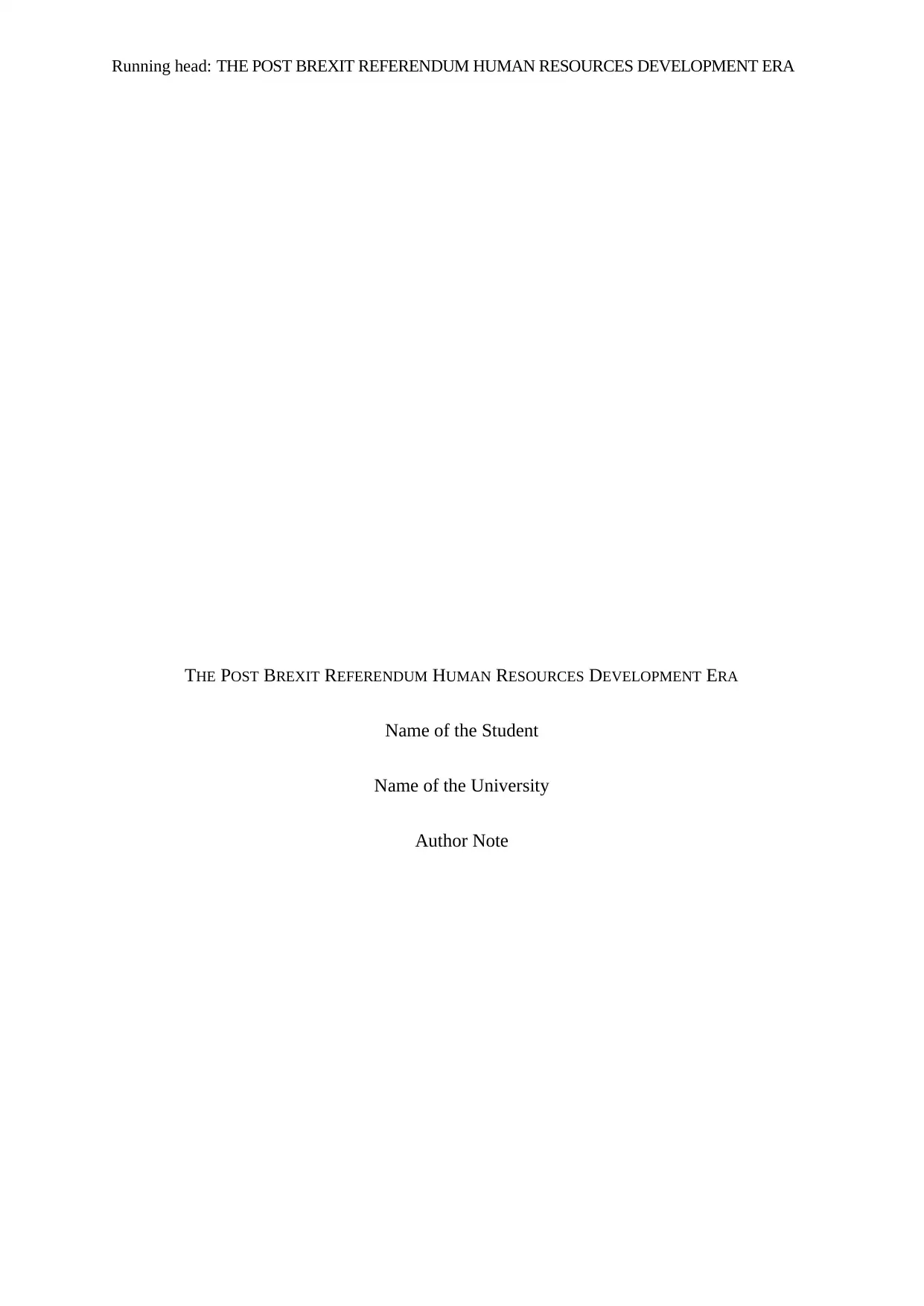
Running head: THE POST BREXIT REFERENDUM HUMAN RESOURCES DEVELOPMENT ERA
THE POST BREXIT REFERENDUM HUMAN RESOURCES DEVELOPMENT ERA
Name of the Student
Name of the University
Author Note
THE POST BREXIT REFERENDUM HUMAN RESOURCES DEVELOPMENT ERA
Name of the Student
Name of the University
Author Note
Paraphrase This Document
Need a fresh take? Get an instant paraphrase of this document with our AI Paraphraser
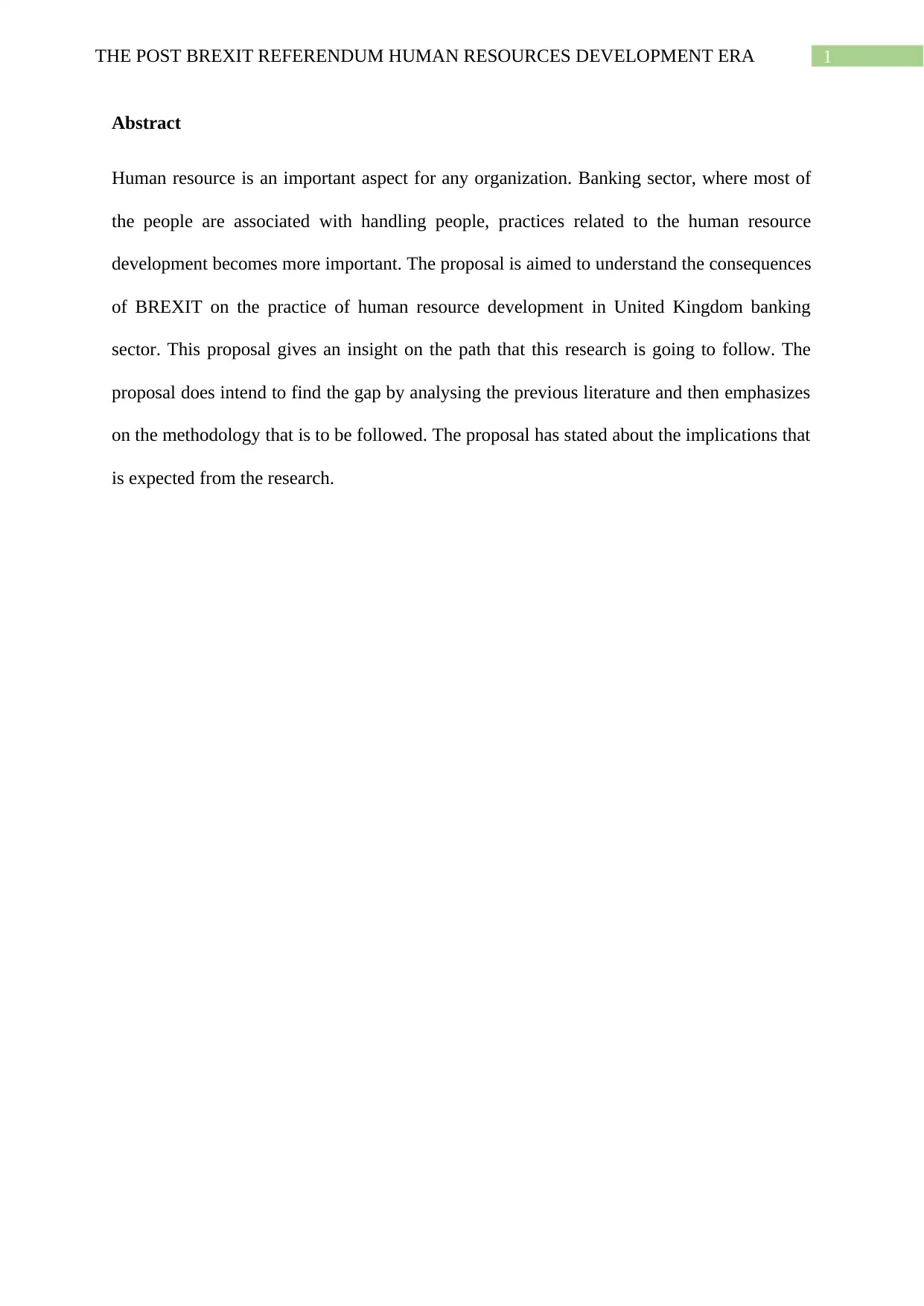
1THE POST BREXIT REFERENDUM HUMAN RESOURCES DEVELOPMENT ERA
Abstract
Human resource is an important aspect for any organization. Banking sector, where most of
the people are associated with handling people, practices related to the human resource
development becomes more important. The proposal is aimed to understand the consequences
of BREXIT on the practice of human resource development in United Kingdom banking
sector. This proposal gives an insight on the path that this research is going to follow. The
proposal does intend to find the gap by analysing the previous literature and then emphasizes
on the methodology that is to be followed. The proposal has stated about the implications that
is expected from the research.
Abstract
Human resource is an important aspect for any organization. Banking sector, where most of
the people are associated with handling people, practices related to the human resource
development becomes more important. The proposal is aimed to understand the consequences
of BREXIT on the practice of human resource development in United Kingdom banking
sector. This proposal gives an insight on the path that this research is going to follow. The
proposal does intend to find the gap by analysing the previous literature and then emphasizes
on the methodology that is to be followed. The proposal has stated about the implications that
is expected from the research.
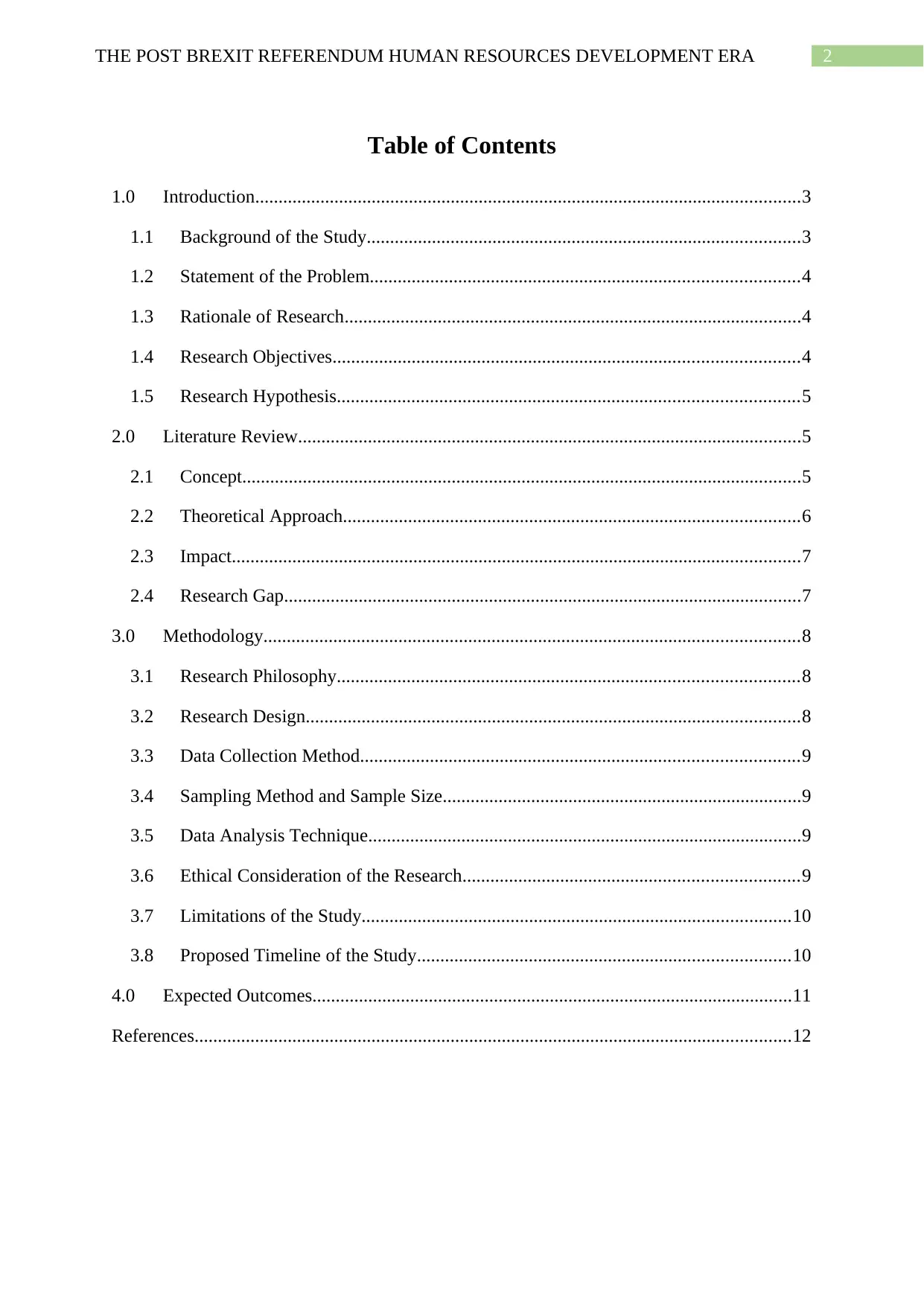
2THE POST BREXIT REFERENDUM HUMAN RESOURCES DEVELOPMENT ERA
Table of Contents
1.0 Introduction.....................................................................................................................3
1.1 Background of the Study.............................................................................................3
1.2 Statement of the Problem............................................................................................4
1.3 Rationale of Research..................................................................................................4
1.4 Research Objectives....................................................................................................4
1.5 Research Hypothesis...................................................................................................5
2.0 Literature Review............................................................................................................5
2.1 Concept........................................................................................................................5
2.2 Theoretical Approach..................................................................................................6
2.3 Impact..........................................................................................................................7
2.4 Research Gap...............................................................................................................7
3.0 Methodology...................................................................................................................8
3.1 Research Philosophy...................................................................................................8
3.2 Research Design..........................................................................................................8
3.3 Data Collection Method..............................................................................................9
3.4 Sampling Method and Sample Size.............................................................................9
3.5 Data Analysis Technique.............................................................................................9
3.6 Ethical Consideration of the Research........................................................................9
3.7 Limitations of the Study............................................................................................10
3.8 Proposed Timeline of the Study................................................................................10
4.0 Expected Outcomes.......................................................................................................11
References................................................................................................................................12
Table of Contents
1.0 Introduction.....................................................................................................................3
1.1 Background of the Study.............................................................................................3
1.2 Statement of the Problem............................................................................................4
1.3 Rationale of Research..................................................................................................4
1.4 Research Objectives....................................................................................................4
1.5 Research Hypothesis...................................................................................................5
2.0 Literature Review............................................................................................................5
2.1 Concept........................................................................................................................5
2.2 Theoretical Approach..................................................................................................6
2.3 Impact..........................................................................................................................7
2.4 Research Gap...............................................................................................................7
3.0 Methodology...................................................................................................................8
3.1 Research Philosophy...................................................................................................8
3.2 Research Design..........................................................................................................8
3.3 Data Collection Method..............................................................................................9
3.4 Sampling Method and Sample Size.............................................................................9
3.5 Data Analysis Technique.............................................................................................9
3.6 Ethical Consideration of the Research........................................................................9
3.7 Limitations of the Study............................................................................................10
3.8 Proposed Timeline of the Study................................................................................10
4.0 Expected Outcomes.......................................................................................................11
References................................................................................................................................12
⊘ This is a preview!⊘
Do you want full access?
Subscribe today to unlock all pages.

Trusted by 1+ million students worldwide
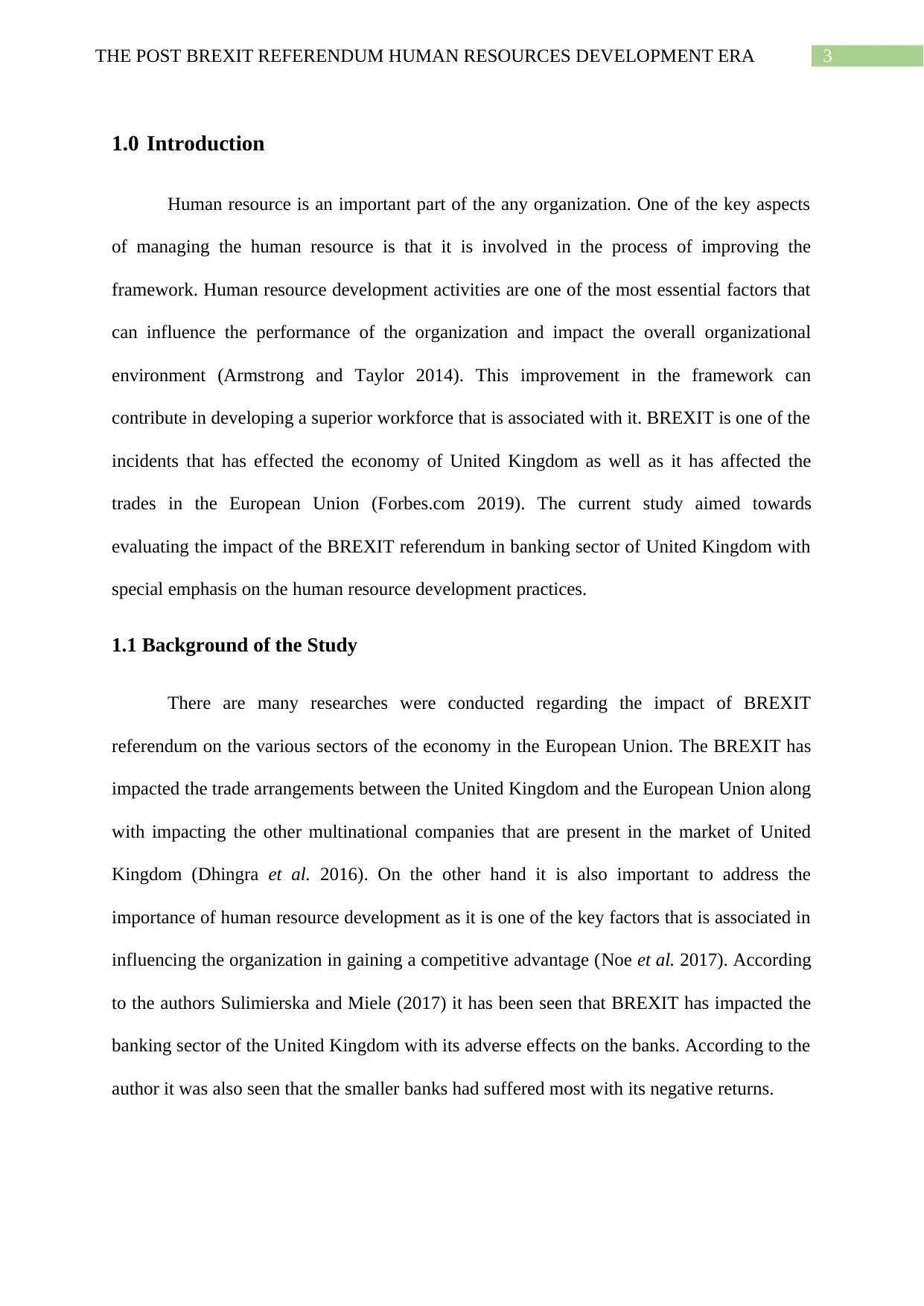
3THE POST BREXIT REFERENDUM HUMAN RESOURCES DEVELOPMENT ERA
1.0 Introduction
Human resource is an important part of the any organization. One of the key aspects
of managing the human resource is that it is involved in the process of improving the
framework. Human resource development activities are one of the most essential factors that
can influence the performance of the organization and impact the overall organizational
environment (Armstrong and Taylor 2014). This improvement in the framework can
contribute in developing a superior workforce that is associated with it. BREXIT is one of the
incidents that has effected the economy of United Kingdom as well as it has affected the
trades in the European Union (Forbes.com 2019). The current study aimed towards
evaluating the impact of the BREXIT referendum in banking sector of United Kingdom with
special emphasis on the human resource development practices.
1.1 Background of the Study
There are many researches were conducted regarding the impact of BREXIT
referendum on the various sectors of the economy in the European Union. The BREXIT has
impacted the trade arrangements between the United Kingdom and the European Union along
with impacting the other multinational companies that are present in the market of United
Kingdom (Dhingra et al. 2016). On the other hand it is also important to address the
importance of human resource development as it is one of the key factors that is associated in
influencing the organization in gaining a competitive advantage (Noe et al. 2017). According
to the authors Sulimierska and Miele (2017) it has been seen that BREXIT has impacted the
banking sector of the United Kingdom with its adverse effects on the banks. According to the
author it was also seen that the smaller banks had suffered most with its negative returns.
1.0 Introduction
Human resource is an important part of the any organization. One of the key aspects
of managing the human resource is that it is involved in the process of improving the
framework. Human resource development activities are one of the most essential factors that
can influence the performance of the organization and impact the overall organizational
environment (Armstrong and Taylor 2014). This improvement in the framework can
contribute in developing a superior workforce that is associated with it. BREXIT is one of the
incidents that has effected the economy of United Kingdom as well as it has affected the
trades in the European Union (Forbes.com 2019). The current study aimed towards
evaluating the impact of the BREXIT referendum in banking sector of United Kingdom with
special emphasis on the human resource development practices.
1.1 Background of the Study
There are many researches were conducted regarding the impact of BREXIT
referendum on the various sectors of the economy in the European Union. The BREXIT has
impacted the trade arrangements between the United Kingdom and the European Union along
with impacting the other multinational companies that are present in the market of United
Kingdom (Dhingra et al. 2016). On the other hand it is also important to address the
importance of human resource development as it is one of the key factors that is associated in
influencing the organization in gaining a competitive advantage (Noe et al. 2017). According
to the authors Sulimierska and Miele (2017) it has been seen that BREXIT has impacted the
banking sector of the United Kingdom with its adverse effects on the banks. According to the
author it was also seen that the smaller banks had suffered most with its negative returns.
Paraphrase This Document
Need a fresh take? Get an instant paraphrase of this document with our AI Paraphraser
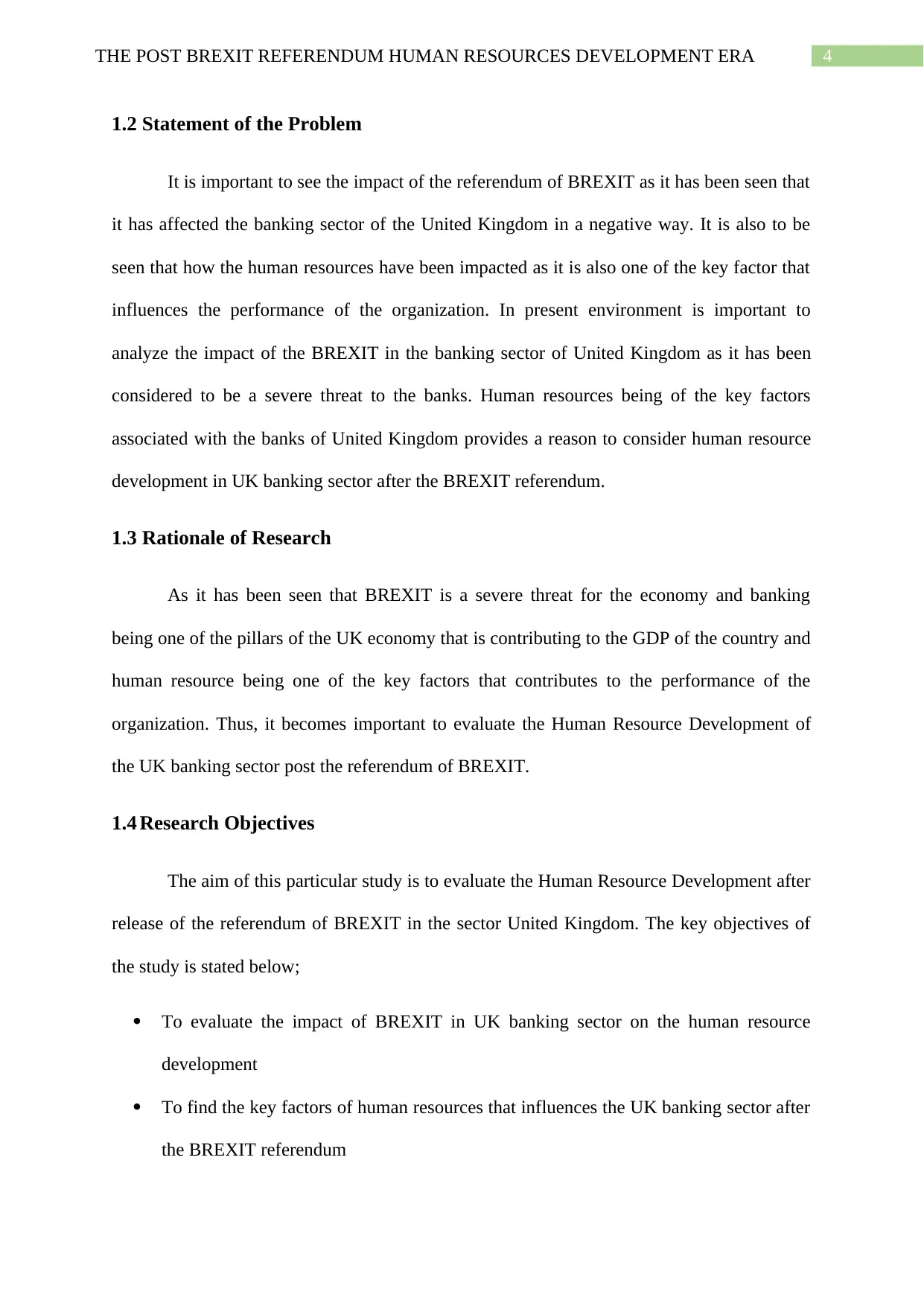
4THE POST BREXIT REFERENDUM HUMAN RESOURCES DEVELOPMENT ERA
1.2 Statement of the Problem
It is important to see the impact of the referendum of BREXIT as it has been seen that
it has affected the banking sector of the United Kingdom in a negative way. It is also to be
seen that how the human resources have been impacted as it is also one of the key factor that
influences the performance of the organization. In present environment is important to
analyze the impact of the BREXIT in the banking sector of United Kingdom as it has been
considered to be a severe threat to the banks. Human resources being of the key factors
associated with the banks of United Kingdom provides a reason to consider human resource
development in UK banking sector after the BREXIT referendum.
1.3 Rationale of Research
As it has been seen that BREXIT is a severe threat for the economy and banking
being one of the pillars of the UK economy that is contributing to the GDP of the country and
human resource being one of the key factors that contributes to the performance of the
organization. Thus, it becomes important to evaluate the Human Resource Development of
the UK banking sector post the referendum of BREXIT.
1.4 Research Objectives
The aim of this particular study is to evaluate the Human Resource Development after
release of the referendum of BREXIT in the sector United Kingdom. The key objectives of
the study is stated below;
To evaluate the impact of BREXIT in UK banking sector on the human resource
development
To find the key factors of human resources that influences the UK banking sector after
the BREXIT referendum
1.2 Statement of the Problem
It is important to see the impact of the referendum of BREXIT as it has been seen that
it has affected the banking sector of the United Kingdom in a negative way. It is also to be
seen that how the human resources have been impacted as it is also one of the key factor that
influences the performance of the organization. In present environment is important to
analyze the impact of the BREXIT in the banking sector of United Kingdom as it has been
considered to be a severe threat to the banks. Human resources being of the key factors
associated with the banks of United Kingdom provides a reason to consider human resource
development in UK banking sector after the BREXIT referendum.
1.3 Rationale of Research
As it has been seen that BREXIT is a severe threat for the economy and banking
being one of the pillars of the UK economy that is contributing to the GDP of the country and
human resource being one of the key factors that contributes to the performance of the
organization. Thus, it becomes important to evaluate the Human Resource Development of
the UK banking sector post the referendum of BREXIT.
1.4 Research Objectives
The aim of this particular study is to evaluate the Human Resource Development after
release of the referendum of BREXIT in the sector United Kingdom. The key objectives of
the study is stated below;
To evaluate the impact of BREXIT in UK banking sector on the human resource
development
To find the key factors of human resources that influences the UK banking sector after
the BREXIT referendum
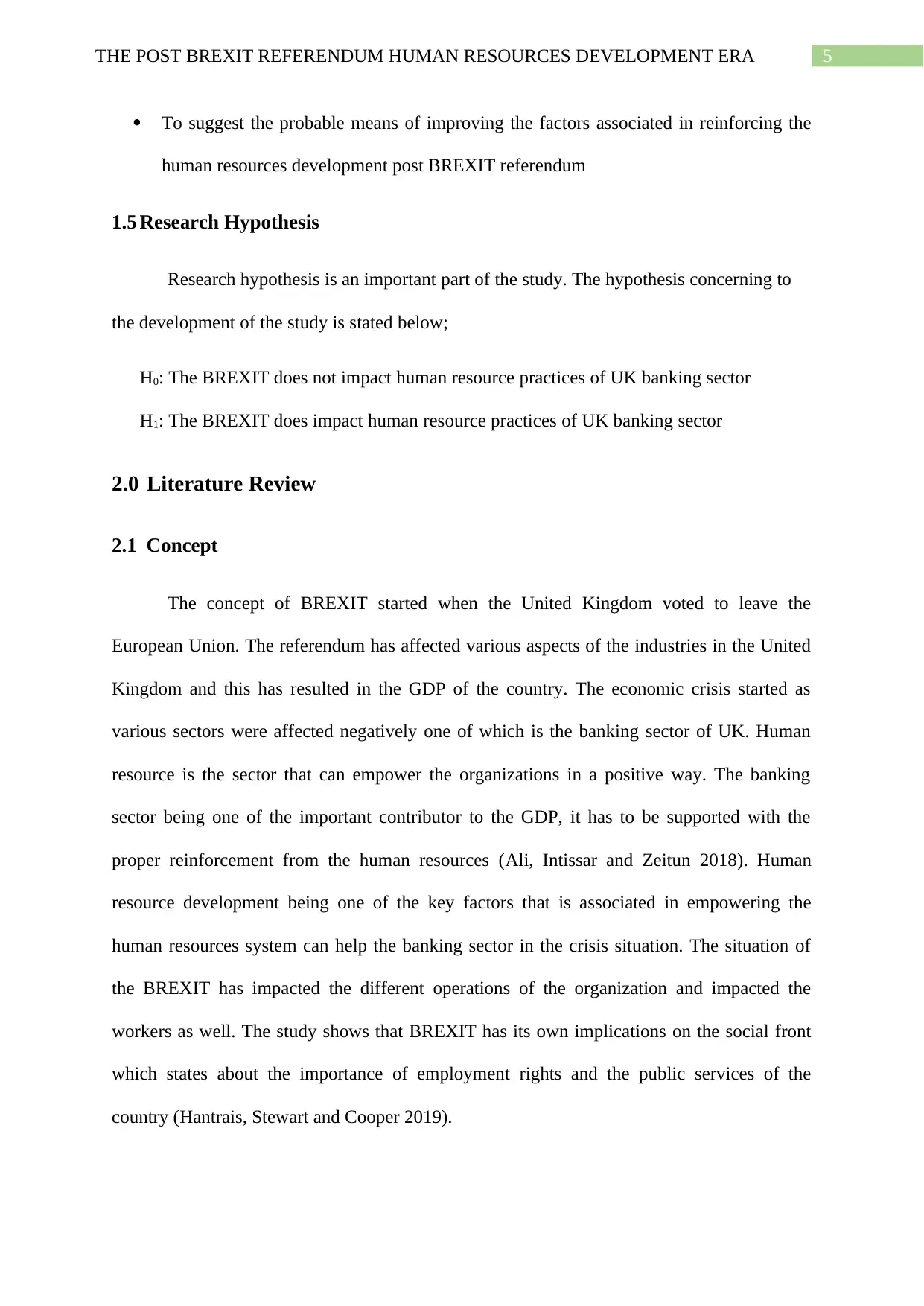
5THE POST BREXIT REFERENDUM HUMAN RESOURCES DEVELOPMENT ERA
To suggest the probable means of improving the factors associated in reinforcing the
human resources development post BREXIT referendum
1.5 Research Hypothesis
Research hypothesis is an important part of the study. The hypothesis concerning to
the development of the study is stated below;
H0: The BREXIT does not impact human resource practices of UK banking sector
H1: The BREXIT does impact human resource practices of UK banking sector
2.0 Literature Review
2.1 Concept
The concept of BREXIT started when the United Kingdom voted to leave the
European Union. The referendum has affected various aspects of the industries in the United
Kingdom and this has resulted in the GDP of the country. The economic crisis started as
various sectors were affected negatively one of which is the banking sector of UK. Human
resource is the sector that can empower the organizations in a positive way. The banking
sector being one of the important contributor to the GDP, it has to be supported with the
proper reinforcement from the human resources (Ali, Intissar and Zeitun 2018). Human
resource development being one of the key factors that is associated in empowering the
human resources system can help the banking sector in the crisis situation. The situation of
the BREXIT has impacted the different operations of the organization and impacted the
workers as well. The study shows that BREXIT has its own implications on the social front
which states about the importance of employment rights and the public services of the
country (Hantrais, Stewart and Cooper 2019).
To suggest the probable means of improving the factors associated in reinforcing the
human resources development post BREXIT referendum
1.5 Research Hypothesis
Research hypothesis is an important part of the study. The hypothesis concerning to
the development of the study is stated below;
H0: The BREXIT does not impact human resource practices of UK banking sector
H1: The BREXIT does impact human resource practices of UK banking sector
2.0 Literature Review
2.1 Concept
The concept of BREXIT started when the United Kingdom voted to leave the
European Union. The referendum has affected various aspects of the industries in the United
Kingdom and this has resulted in the GDP of the country. The economic crisis started as
various sectors were affected negatively one of which is the banking sector of UK. Human
resource is the sector that can empower the organizations in a positive way. The banking
sector being one of the important contributor to the GDP, it has to be supported with the
proper reinforcement from the human resources (Ali, Intissar and Zeitun 2018). Human
resource development being one of the key factors that is associated in empowering the
human resources system can help the banking sector in the crisis situation. The situation of
the BREXIT has impacted the different operations of the organization and impacted the
workers as well. The study shows that BREXIT has its own implications on the social front
which states about the importance of employment rights and the public services of the
country (Hantrais, Stewart and Cooper 2019).
⊘ This is a preview!⊘
Do you want full access?
Subscribe today to unlock all pages.

Trusted by 1+ million students worldwide
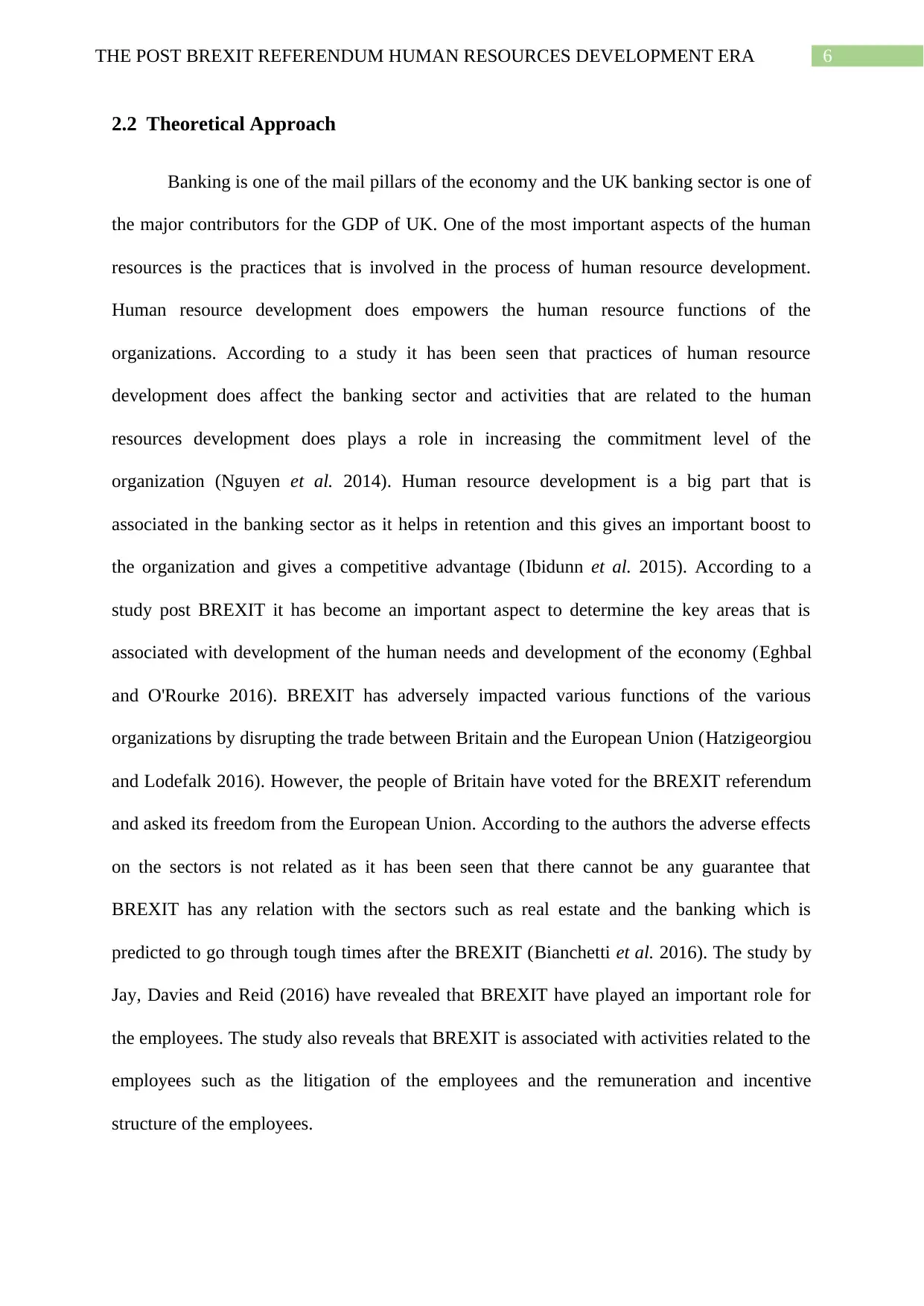
6THE POST BREXIT REFERENDUM HUMAN RESOURCES DEVELOPMENT ERA
2.2 Theoretical Approach
Banking is one of the mail pillars of the economy and the UK banking sector is one of
the major contributors for the GDP of UK. One of the most important aspects of the human
resources is the practices that is involved in the process of human resource development.
Human resource development does empowers the human resource functions of the
organizations. According to a study it has been seen that practices of human resource
development does affect the banking sector and activities that are related to the human
resources development does plays a role in increasing the commitment level of the
organization (Nguyen et al. 2014). Human resource development is a big part that is
associated in the banking sector as it helps in retention and this gives an important boost to
the organization and gives a competitive advantage (Ibidunn et al. 2015). According to a
study post BREXIT it has become an important aspect to determine the key areas that is
associated with development of the human needs and development of the economy (Eghbal
and O'Rourke 2016). BREXIT has adversely impacted various functions of the various
organizations by disrupting the trade between Britain and the European Union (Hatzigeorgiou
and Lodefalk 2016). However, the people of Britain have voted for the BREXIT referendum
and asked its freedom from the European Union. According to the authors the adverse effects
on the sectors is not related as it has been seen that there cannot be any guarantee that
BREXIT has any relation with the sectors such as real estate and the banking which is
predicted to go through tough times after the BREXIT (Bianchetti et al. 2016). The study by
Jay, Davies and Reid (2016) have revealed that BREXIT have played an important role for
the employees. The study also reveals that BREXIT is associated with activities related to the
employees such as the litigation of the employees and the remuneration and incentive
structure of the employees.
2.2 Theoretical Approach
Banking is one of the mail pillars of the economy and the UK banking sector is one of
the major contributors for the GDP of UK. One of the most important aspects of the human
resources is the practices that is involved in the process of human resource development.
Human resource development does empowers the human resource functions of the
organizations. According to a study it has been seen that practices of human resource
development does affect the banking sector and activities that are related to the human
resources development does plays a role in increasing the commitment level of the
organization (Nguyen et al. 2014). Human resource development is a big part that is
associated in the banking sector as it helps in retention and this gives an important boost to
the organization and gives a competitive advantage (Ibidunn et al. 2015). According to a
study post BREXIT it has become an important aspect to determine the key areas that is
associated with development of the human needs and development of the economy (Eghbal
and O'Rourke 2016). BREXIT has adversely impacted various functions of the various
organizations by disrupting the trade between Britain and the European Union (Hatzigeorgiou
and Lodefalk 2016). However, the people of Britain have voted for the BREXIT referendum
and asked its freedom from the European Union. According to the authors the adverse effects
on the sectors is not related as it has been seen that there cannot be any guarantee that
BREXIT has any relation with the sectors such as real estate and the banking which is
predicted to go through tough times after the BREXIT (Bianchetti et al. 2016). The study by
Jay, Davies and Reid (2016) have revealed that BREXIT have played an important role for
the employees. The study also reveals that BREXIT is associated with activities related to the
employees such as the litigation of the employees and the remuneration and incentive
structure of the employees.
Paraphrase This Document
Need a fresh take? Get an instant paraphrase of this document with our AI Paraphraser
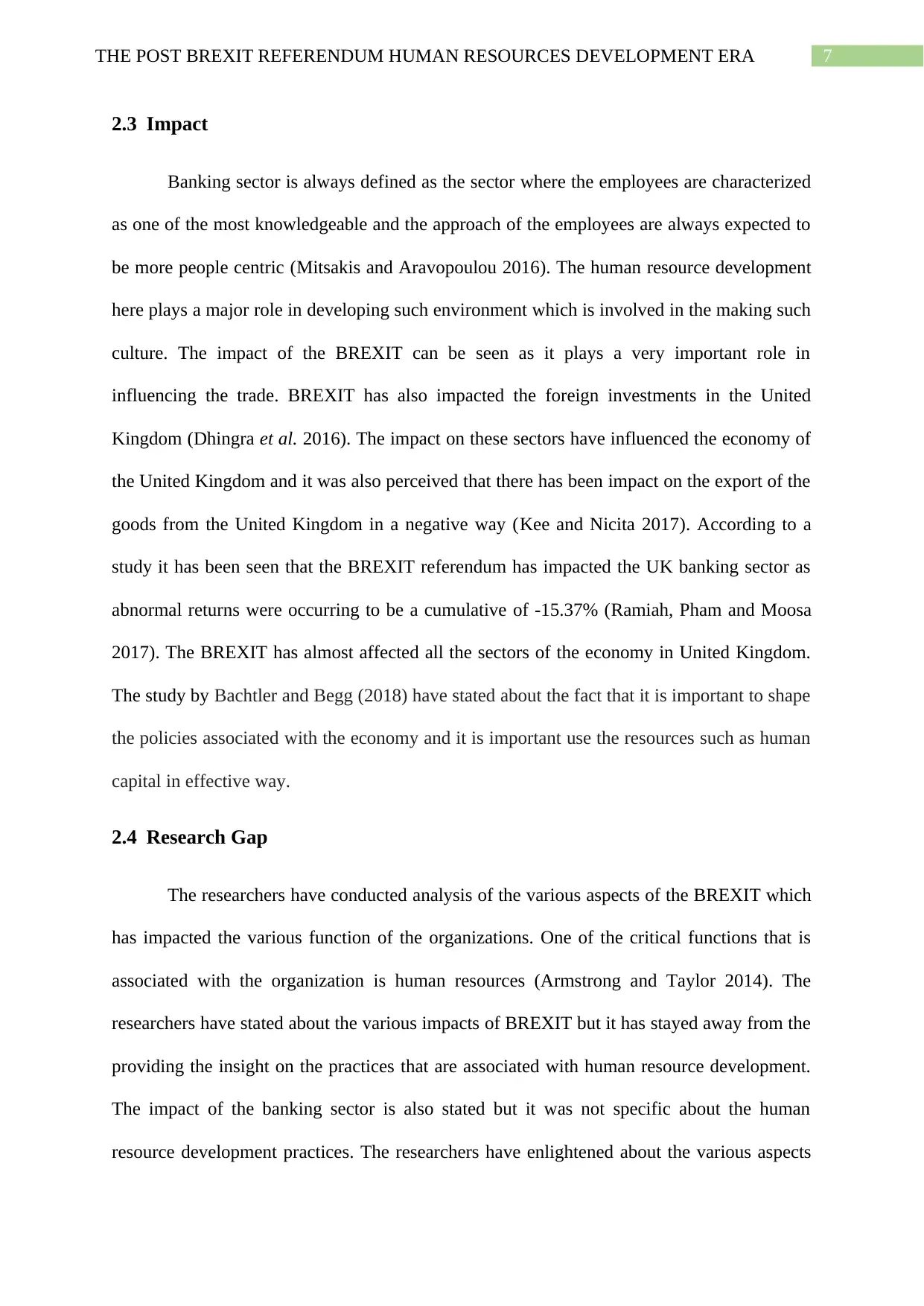
7THE POST BREXIT REFERENDUM HUMAN RESOURCES DEVELOPMENT ERA
2.3 Impact
Banking sector is always defined as the sector where the employees are characterized
as one of the most knowledgeable and the approach of the employees are always expected to
be more people centric (Mitsakis and Aravopoulou 2016). The human resource development
here plays a major role in developing such environment which is involved in the making such
culture. The impact of the BREXIT can be seen as it plays a very important role in
influencing the trade. BREXIT has also impacted the foreign investments in the United
Kingdom (Dhingra et al. 2016). The impact on these sectors have influenced the economy of
the United Kingdom and it was also perceived that there has been impact on the export of the
goods from the United Kingdom in a negative way (Kee and Nicita 2017). According to a
study it has been seen that the BREXIT referendum has impacted the UK banking sector as
abnormal returns were occurring to be a cumulative of -15.37% (Ramiah, Pham and Moosa
2017). The BREXIT has almost affected all the sectors of the economy in United Kingdom.
The study by Bachtler and Begg (2018) have stated about the fact that it is important to shape
the policies associated with the economy and it is important use the resources such as human
capital in effective way.
2.4 Research Gap
The researchers have conducted analysis of the various aspects of the BREXIT which
has impacted the various function of the organizations. One of the critical functions that is
associated with the organization is human resources (Armstrong and Taylor 2014). The
researchers have stated about the various impacts of BREXIT but it has stayed away from the
providing the insight on the practices that are associated with human resource development.
The impact of the banking sector is also stated but it was not specific about the human
resource development practices. The researchers have enlightened about the various aspects
2.3 Impact
Banking sector is always defined as the sector where the employees are characterized
as one of the most knowledgeable and the approach of the employees are always expected to
be more people centric (Mitsakis and Aravopoulou 2016). The human resource development
here plays a major role in developing such environment which is involved in the making such
culture. The impact of the BREXIT can be seen as it plays a very important role in
influencing the trade. BREXIT has also impacted the foreign investments in the United
Kingdom (Dhingra et al. 2016). The impact on these sectors have influenced the economy of
the United Kingdom and it was also perceived that there has been impact on the export of the
goods from the United Kingdom in a negative way (Kee and Nicita 2017). According to a
study it has been seen that the BREXIT referendum has impacted the UK banking sector as
abnormal returns were occurring to be a cumulative of -15.37% (Ramiah, Pham and Moosa
2017). The BREXIT has almost affected all the sectors of the economy in United Kingdom.
The study by Bachtler and Begg (2018) have stated about the fact that it is important to shape
the policies associated with the economy and it is important use the resources such as human
capital in effective way.
2.4 Research Gap
The researchers have conducted analysis of the various aspects of the BREXIT which
has impacted the various function of the organizations. One of the critical functions that is
associated with the organization is human resources (Armstrong and Taylor 2014). The
researchers have stated about the various impacts of BREXIT but it has stayed away from the
providing the insight on the practices that are associated with human resource development.
The impact of the banking sector is also stated but it was not specific about the human
resource development practices. The researchers have enlightened about the various aspects
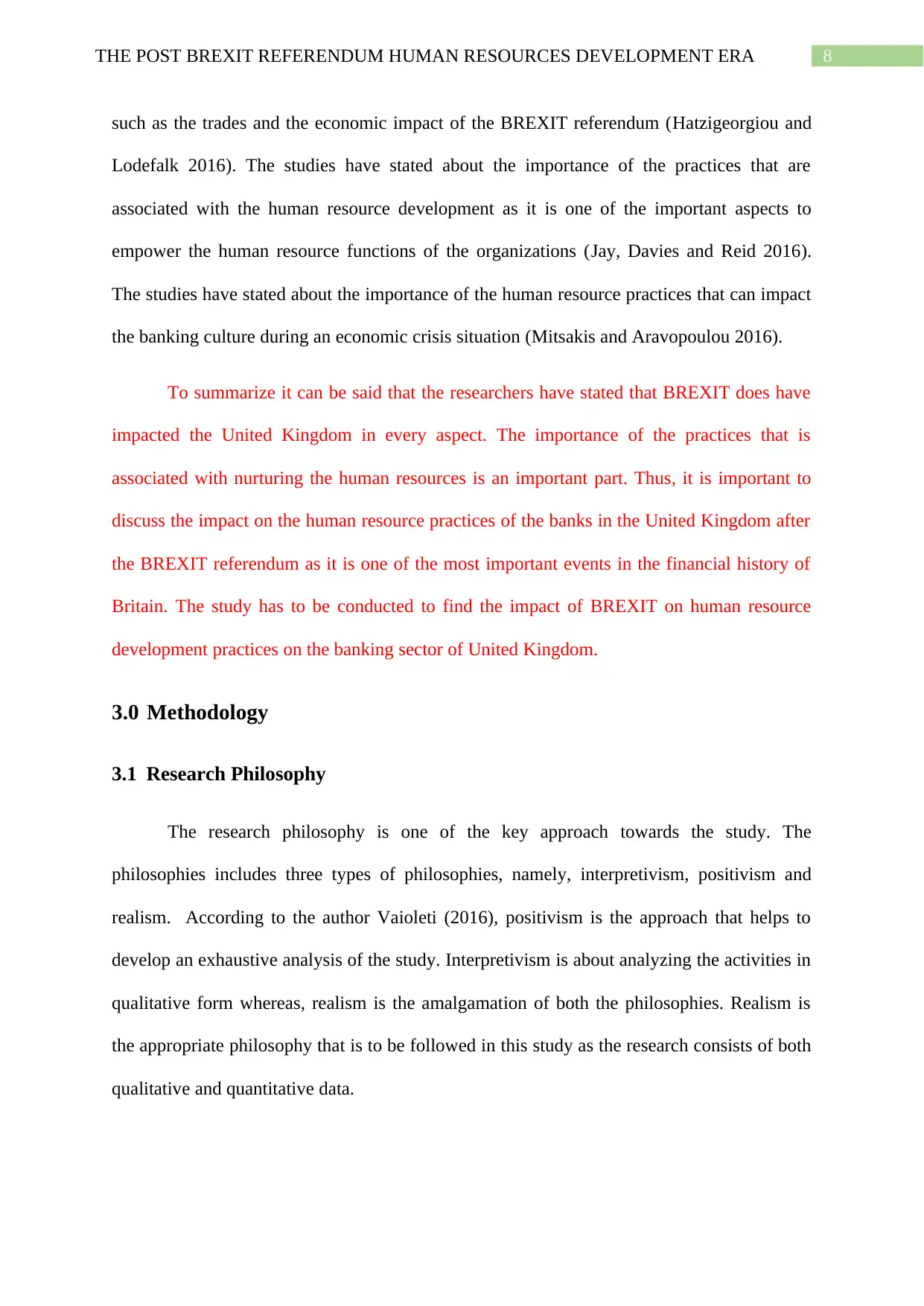
8THE POST BREXIT REFERENDUM HUMAN RESOURCES DEVELOPMENT ERA
such as the trades and the economic impact of the BREXIT referendum (Hatzigeorgiou and
Lodefalk 2016). The studies have stated about the importance of the practices that are
associated with the human resource development as it is one of the important aspects to
empower the human resource functions of the organizations (Jay, Davies and Reid 2016).
The studies have stated about the importance of the human resource practices that can impact
the banking culture during an economic crisis situation (Mitsakis and Aravopoulou 2016).
To summarize it can be said that the researchers have stated that BREXIT does have
impacted the United Kingdom in every aspect. The importance of the practices that is
associated with nurturing the human resources is an important part. Thus, it is important to
discuss the impact on the human resource practices of the banks in the United Kingdom after
the BREXIT referendum as it is one of the most important events in the financial history of
Britain. The study has to be conducted to find the impact of BREXIT on human resource
development practices on the banking sector of United Kingdom.
3.0 Methodology
3.1 Research Philosophy
The research philosophy is one of the key approach towards the study. The
philosophies includes three types of philosophies, namely, interpretivism, positivism and
realism. According to the author Vaioleti (2016), positivism is the approach that helps to
develop an exhaustive analysis of the study. Interpretivism is about analyzing the activities in
qualitative form whereas, realism is the amalgamation of both the philosophies. Realism is
the appropriate philosophy that is to be followed in this study as the research consists of both
qualitative and quantitative data.
such as the trades and the economic impact of the BREXIT referendum (Hatzigeorgiou and
Lodefalk 2016). The studies have stated about the importance of the practices that are
associated with the human resource development as it is one of the important aspects to
empower the human resource functions of the organizations (Jay, Davies and Reid 2016).
The studies have stated about the importance of the human resource practices that can impact
the banking culture during an economic crisis situation (Mitsakis and Aravopoulou 2016).
To summarize it can be said that the researchers have stated that BREXIT does have
impacted the United Kingdom in every aspect. The importance of the practices that is
associated with nurturing the human resources is an important part. Thus, it is important to
discuss the impact on the human resource practices of the banks in the United Kingdom after
the BREXIT referendum as it is one of the most important events in the financial history of
Britain. The study has to be conducted to find the impact of BREXIT on human resource
development practices on the banking sector of United Kingdom.
3.0 Methodology
3.1 Research Philosophy
The research philosophy is one of the key approach towards the study. The
philosophies includes three types of philosophies, namely, interpretivism, positivism and
realism. According to the author Vaioleti (2016), positivism is the approach that helps to
develop an exhaustive analysis of the study. Interpretivism is about analyzing the activities in
qualitative form whereas, realism is the amalgamation of both the philosophies. Realism is
the appropriate philosophy that is to be followed in this study as the research consists of both
qualitative and quantitative data.
⊘ This is a preview!⊘
Do you want full access?
Subscribe today to unlock all pages.

Trusted by 1+ million students worldwide
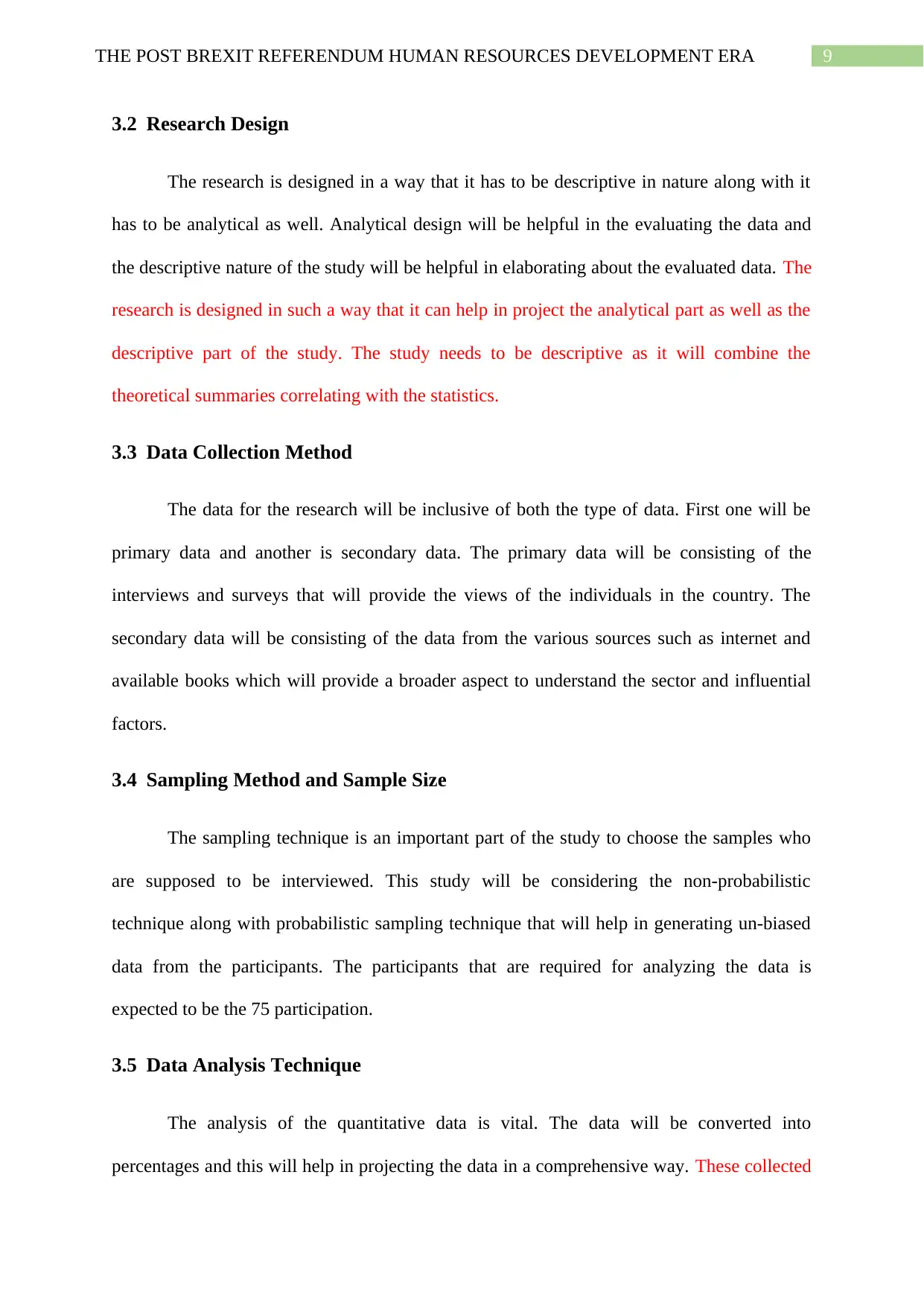
9THE POST BREXIT REFERENDUM HUMAN RESOURCES DEVELOPMENT ERA
3.2 Research Design
The research is designed in a way that it has to be descriptive in nature along with it
has to be analytical as well. Analytical design will be helpful in the evaluating the data and
the descriptive nature of the study will be helpful in elaborating about the evaluated data. The
research is designed in such a way that it can help in project the analytical part as well as the
descriptive part of the study. The study needs to be descriptive as it will combine the
theoretical summaries correlating with the statistics.
3.3 Data Collection Method
The data for the research will be inclusive of both the type of data. First one will be
primary data and another is secondary data. The primary data will be consisting of the
interviews and surveys that will provide the views of the individuals in the country. The
secondary data will be consisting of the data from the various sources such as internet and
available books which will provide a broader aspect to understand the sector and influential
factors.
3.4 Sampling Method and Sample Size
The sampling technique is an important part of the study to choose the samples who
are supposed to be interviewed. This study will be considering the non-probabilistic
technique along with probabilistic sampling technique that will help in generating un-biased
data from the participants. The participants that are required for analyzing the data is
expected to be the 75 participation.
3.5 Data Analysis Technique
The analysis of the quantitative data is vital. The data will be converted into
percentages and this will help in projecting the data in a comprehensive way. These collected
3.2 Research Design
The research is designed in a way that it has to be descriptive in nature along with it
has to be analytical as well. Analytical design will be helpful in the evaluating the data and
the descriptive nature of the study will be helpful in elaborating about the evaluated data. The
research is designed in such a way that it can help in project the analytical part as well as the
descriptive part of the study. The study needs to be descriptive as it will combine the
theoretical summaries correlating with the statistics.
3.3 Data Collection Method
The data for the research will be inclusive of both the type of data. First one will be
primary data and another is secondary data. The primary data will be consisting of the
interviews and surveys that will provide the views of the individuals in the country. The
secondary data will be consisting of the data from the various sources such as internet and
available books which will provide a broader aspect to understand the sector and influential
factors.
3.4 Sampling Method and Sample Size
The sampling technique is an important part of the study to choose the samples who
are supposed to be interviewed. This study will be considering the non-probabilistic
technique along with probabilistic sampling technique that will help in generating un-biased
data from the participants. The participants that are required for analyzing the data is
expected to be the 75 participation.
3.5 Data Analysis Technique
The analysis of the quantitative data is vital. The data will be converted into
percentages and this will help in projecting the data in a comprehensive way. These collected
Paraphrase This Document
Need a fresh take? Get an instant paraphrase of this document with our AI Paraphraser
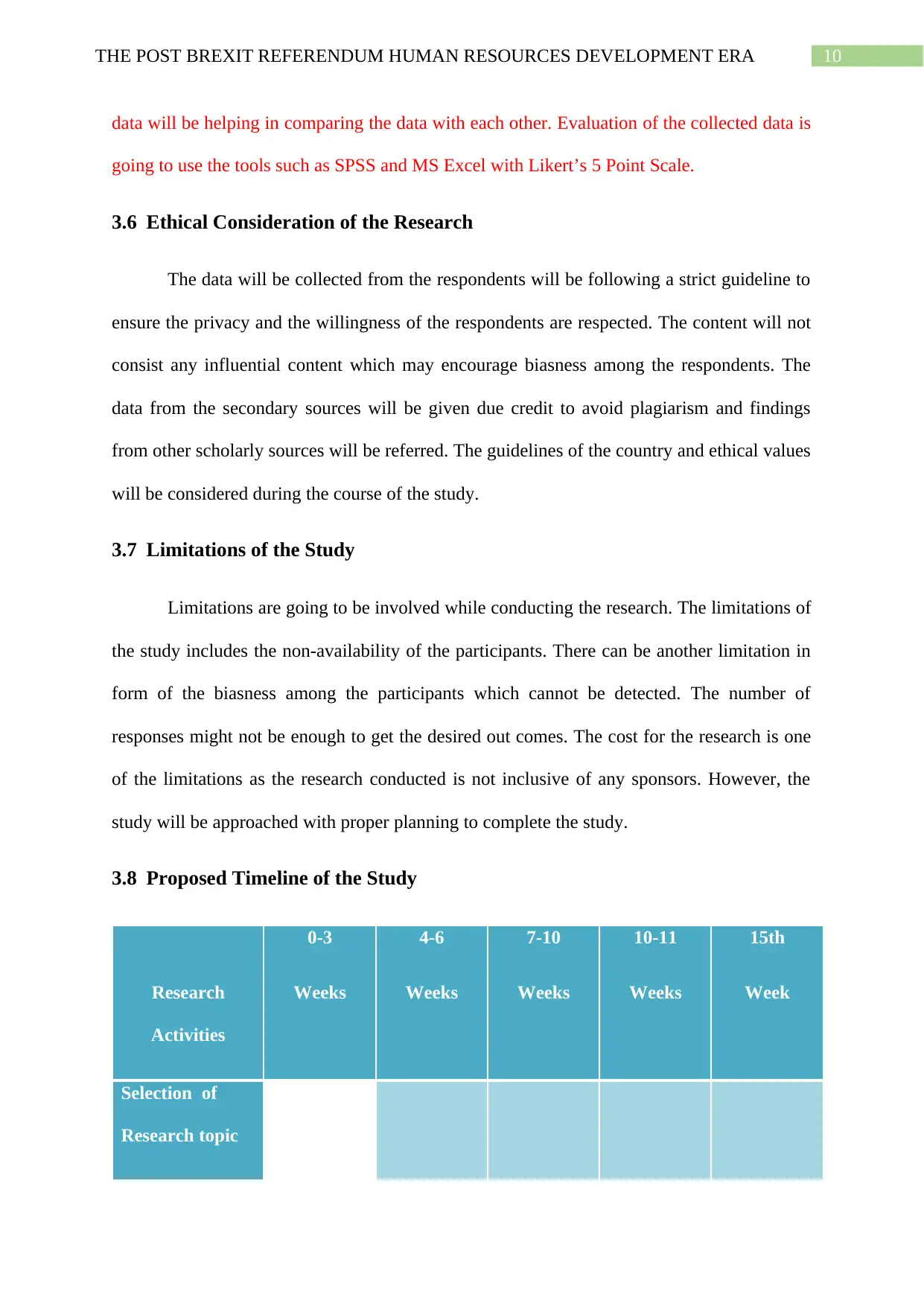
10THE POST BREXIT REFERENDUM HUMAN RESOURCES DEVELOPMENT ERA
data will be helping in comparing the data with each other. Evaluation of the collected data is
going to use the tools such as SPSS and MS Excel with Likert’s 5 Point Scale.
3.6 Ethical Consideration of the Research
The data will be collected from the respondents will be following a strict guideline to
ensure the privacy and the willingness of the respondents are respected. The content will not
consist any influential content which may encourage biasness among the respondents. The
data from the secondary sources will be given due credit to avoid plagiarism and findings
from other scholarly sources will be referred. The guidelines of the country and ethical values
will be considered during the course of the study.
3.7 Limitations of the Study
Limitations are going to be involved while conducting the research. The limitations of
the study includes the non-availability of the participants. There can be another limitation in
form of the biasness among the participants which cannot be detected. The number of
responses might not be enough to get the desired out comes. The cost for the research is one
of the limitations as the research conducted is not inclusive of any sponsors. However, the
study will be approached with proper planning to complete the study.
3.8 Proposed Timeline of the Study
0-3 4-6 7-10 10-11 15th
Research
Activities
Weeks Weeks Weeks Weeks Week
Selection of
Research topic
data will be helping in comparing the data with each other. Evaluation of the collected data is
going to use the tools such as SPSS and MS Excel with Likert’s 5 Point Scale.
3.6 Ethical Consideration of the Research
The data will be collected from the respondents will be following a strict guideline to
ensure the privacy and the willingness of the respondents are respected. The content will not
consist any influential content which may encourage biasness among the respondents. The
data from the secondary sources will be given due credit to avoid plagiarism and findings
from other scholarly sources will be referred. The guidelines of the country and ethical values
will be considered during the course of the study.
3.7 Limitations of the Study
Limitations are going to be involved while conducting the research. The limitations of
the study includes the non-availability of the participants. There can be another limitation in
form of the biasness among the participants which cannot be detected. The number of
responses might not be enough to get the desired out comes. The cost for the research is one
of the limitations as the research conducted is not inclusive of any sponsors. However, the
study will be approached with proper planning to complete the study.
3.8 Proposed Timeline of the Study
0-3 4-6 7-10 10-11 15th
Research
Activities
Weeks Weeks Weeks Weeks Week
Selection of
Research topic
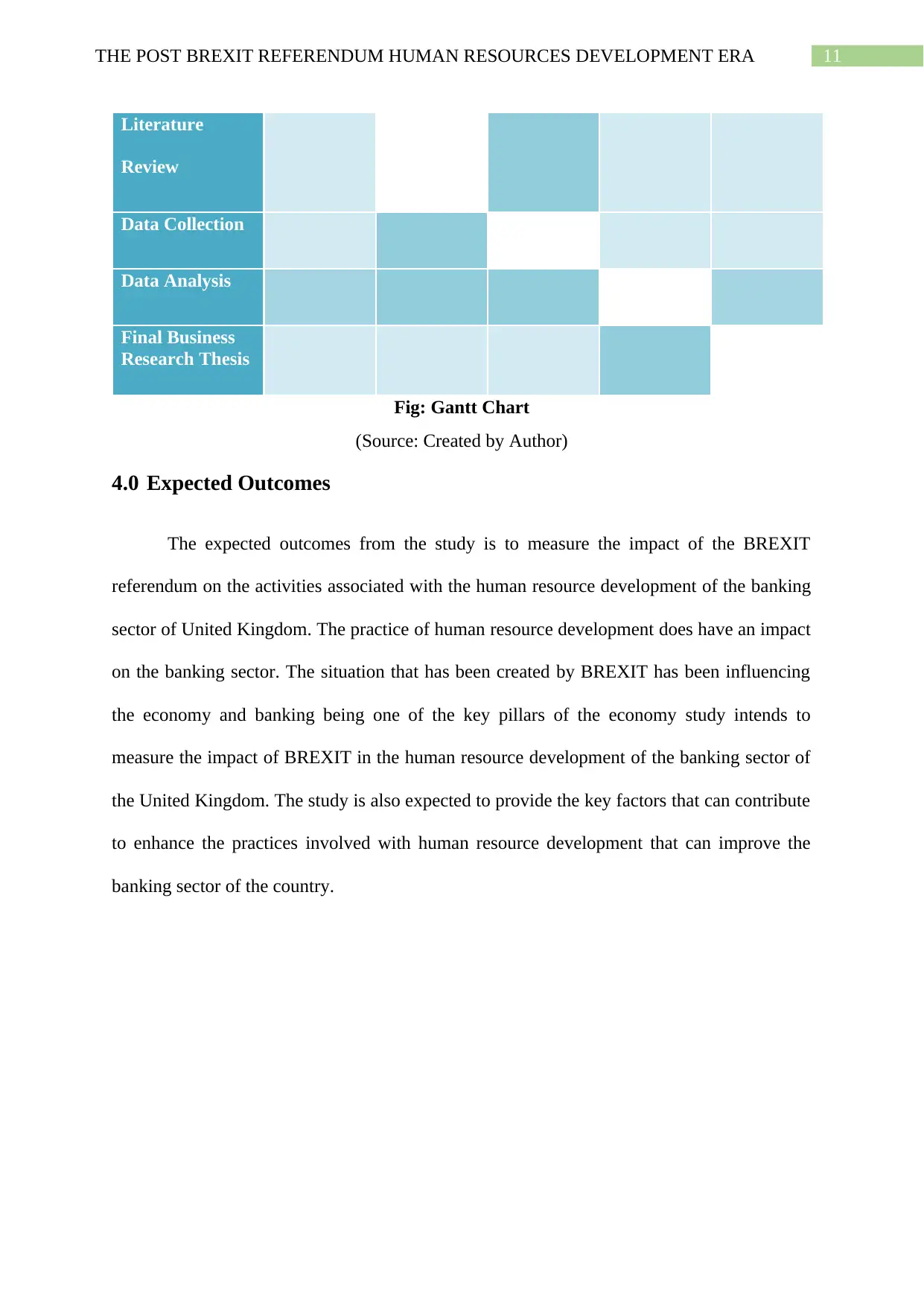
11THE POST BREXIT REFERENDUM HUMAN RESOURCES DEVELOPMENT ERA
Literature
Review
Data Collection
Data Analysis
Final Business
Research Thesis
Fig: Gantt Chart
(Source: Created by Author)
4.0 Expected Outcomes
The expected outcomes from the study is to measure the impact of the BREXIT
referendum on the activities associated with the human resource development of the banking
sector of United Kingdom. The practice of human resource development does have an impact
on the banking sector. The situation that has been created by BREXIT has been influencing
the economy and banking being one of the key pillars of the economy study intends to
measure the impact of BREXIT in the human resource development of the banking sector of
the United Kingdom. The study is also expected to provide the key factors that can contribute
to enhance the practices involved with human resource development that can improve the
banking sector of the country.
Literature
Review
Data Collection
Data Analysis
Final Business
Research Thesis
Fig: Gantt Chart
(Source: Created by Author)
4.0 Expected Outcomes
The expected outcomes from the study is to measure the impact of the BREXIT
referendum on the activities associated with the human resource development of the banking
sector of United Kingdom. The practice of human resource development does have an impact
on the banking sector. The situation that has been created by BREXIT has been influencing
the economy and banking being one of the key pillars of the economy study intends to
measure the impact of BREXIT in the human resource development of the banking sector of
the United Kingdom. The study is also expected to provide the key factors that can contribute
to enhance the practices involved with human resource development that can improve the
banking sector of the country.
⊘ This is a preview!⊘
Do you want full access?
Subscribe today to unlock all pages.

Trusted by 1+ million students worldwide
1 out of 15
Related Documents
Your All-in-One AI-Powered Toolkit for Academic Success.
+13062052269
info@desklib.com
Available 24*7 on WhatsApp / Email
![[object Object]](/_next/static/media/star-bottom.7253800d.svg)
Unlock your academic potential
Copyright © 2020–2025 A2Z Services. All Rights Reserved. Developed and managed by ZUCOL.




